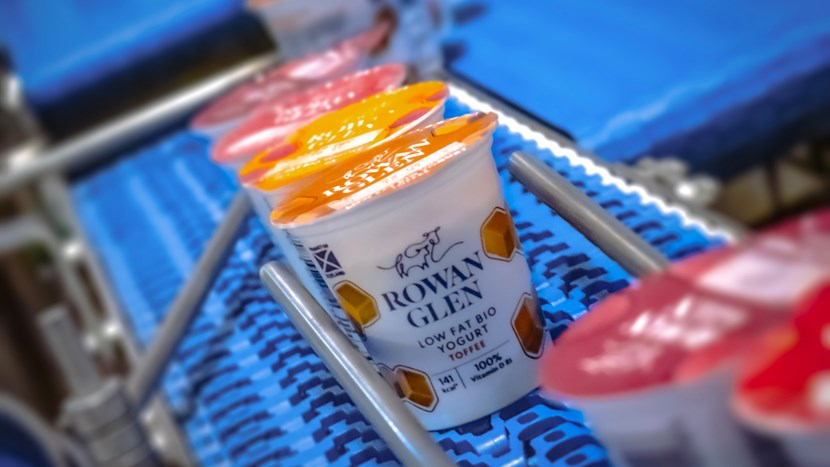School smoothy yogurt gets a healthy refresh
Topics

“This funding was a massive help … it really can be the difference between pursuing a project or not”
Rowan Glen is a yogurt producer located on the edge of the Galloway Forest in south-west Scotland.
Our site in Palnure, Dumfries & Galloway has been producing yogurt for over 30 years, making it one of the longest-established yogurt manufacturing sites in Scotland. We are proud to use milk from local farms to create our products.
Why add fibre and vitamin D?
Our low-fat Smoothy yogurt range is already designed specifically to meet school nutritional
requirements.
However as children in particular often lack sufficient vitamin D due to a lack of sunlight we identified a gap to include that in a reformulated product. The addition of fibre was flagged to us at the Reformul8 conference the previous year.
Using the £5,000 from the Reformul8 Challenge Fund 4, we set out to modernise not only the packaging but the product within, to provide a healthier, “clean label” product, while retaining the quality and characteristic Rowan Glen taste.
What we did
Our project had two primary goals:
- to add significant nutritional benefits by fortifying our yogurts with vitamin D and fibre.
- to make the products “clean label” where possible. The technical challenge was to achieve these goals without compromising the taste, texture and flavour profile that are core to our brand.
Setting nutritional benchmarks: we aimed to include 100% of the recommended daily intake of Vitamin D. We also aimed to add fibre to the product, increasing the level from practically zero to 1.4g per 100g.
The clean label challenge: we worked closely with our ingredient suppliers to reformulate the fruit preps, particularly the strawberry and apricot flavours, using natural colours and flavourings.
This was particularly challenging as a medium-sized business, as we had to persuade suppliers to create bespoke ingredients.
Tasting and testing: to avoid wasting time and resources starting from scratch, we leveraged our in-house expertise and historical trial data.
We knew that adding too much fibre would affect the taste, so we carefully calibrated the to a level that would provide a significant nutritional benefit without being detrimental to theproduct’s flavour profile.
We performed several trials to maintain the taste and colour for the clean-label fruit preps.
The findings
We managed to maintain our holistic approach to reformulation, which takes all aspects of the product into consideration from nutrition to consumer preferences.
- Vitamin D: we added 100% of the recommended daily intake of Vitamin D (12µg) per 85g pot, as confirmed by nutritional testing. This was a new fortification for this specific product, which previously had none.
- Fibre: we successfully added fibre to the product, achieving a level of 1.4g per 100g. We quickly realised that we couldn’t get to a “high in fibre” claim level due to the impact on taste, but this gives us the important differentiator of an “added fibre” claim. This will help children and teenagers meet their NHS recommended intake of fibre: 20g for 5-11 year-olds and 25g for 11-16 year-olds
- Clean label success: we secured clean-label preparations for our strawberry and apricot flavours by removing ingredients like citric acid, locust bean gum and potassium sorbate. This was a key goal, as was the removal of all non-dairy ingredients added under previous ownership. The toffee flavour however, proved a lot more difficult to reformulate without a significant change in taste. As it’s probably our most-loved flavour – and very hard to mimic that using natural flavourings - we didn’t proceed with that.
The benefits and learning points
This funding was a massive help and we really can’t underestimate the difference it made. For a medium-sized business, this has a huge impact on finances and it really can be the difference between pursuing a project or not.
The reformulation was strategically important as it allowed us to secure a competitive advantage. By adding vitamin D and fibre, our product now stands out in the marketplace. This - combined with our local provenance - gives us a competitive edge that helps us secure contracts to supply Scottish schools. We also gained an understanding of the pressure from retailers for “clean label” alternatives, which influenced our decision to amend ingredients and commit to better health outcomes.
As a smaller business, we often lack the resources for extensive research so there is a clear benefit in the value of expert advice and collaboration.
Attending the Reformul8 conference was crucial, as it led us to consider fibre as a key area for improvement. Our 30-plus years of experience as a yogurt manufacturer means we can react quickly to customer needs, but it’s also important to listen to outside experts and not rely solely on a fixed idea of where to go. This knowledge, combined with strong supplier relationships, allowed us to modernise our product without compromising our brand.
Similarly, we realised our products needed to evolve, but we needed to balance modernisation and consumer trust in our brand. We were careful not to make too many noticeable changes that could lead to a perception of a “cheaper” product, especially as a new business.
Our goal was to make sure the consumer recognises the ingredients on the pot - for example, by replacing citric acid with lemon juice - and to maintain the taste and texture that people expect.
This approach makes sure our brand reputation for great-tasting yogurt remains intact while meeting consumer health trends.
